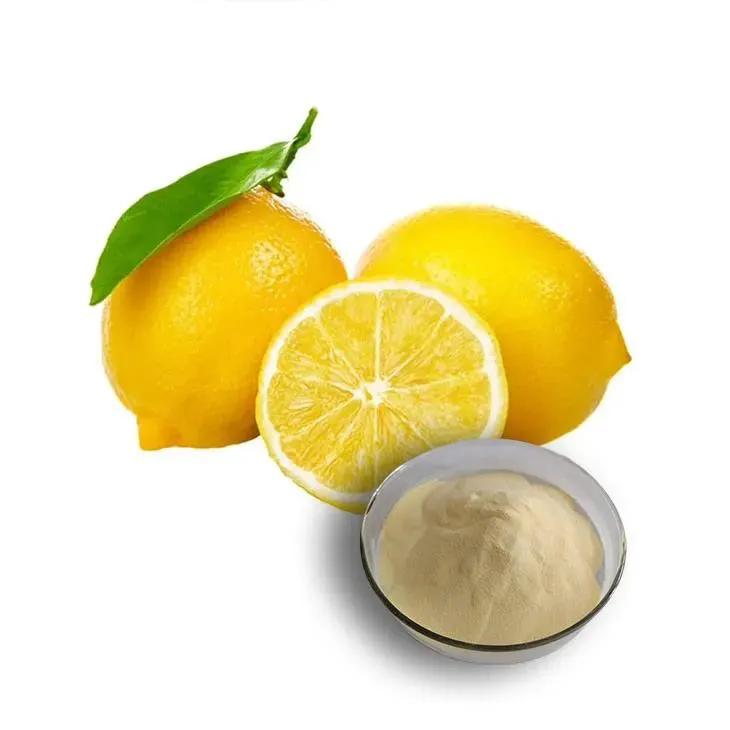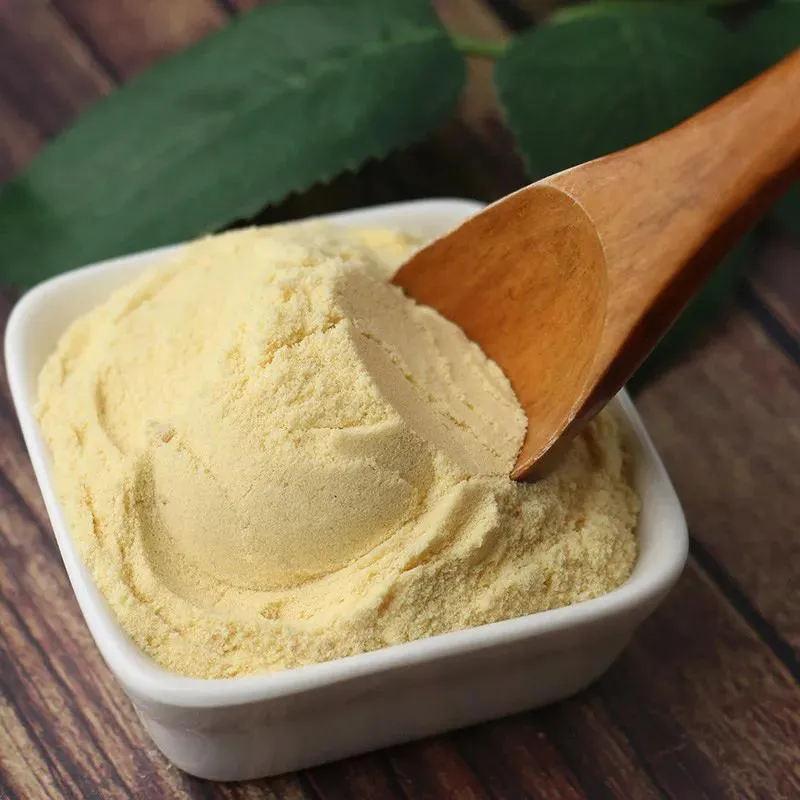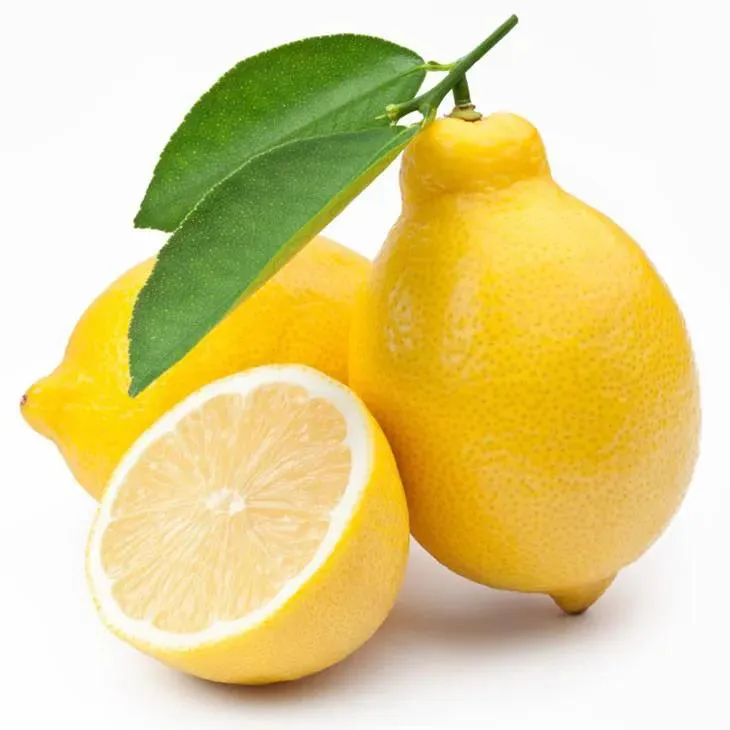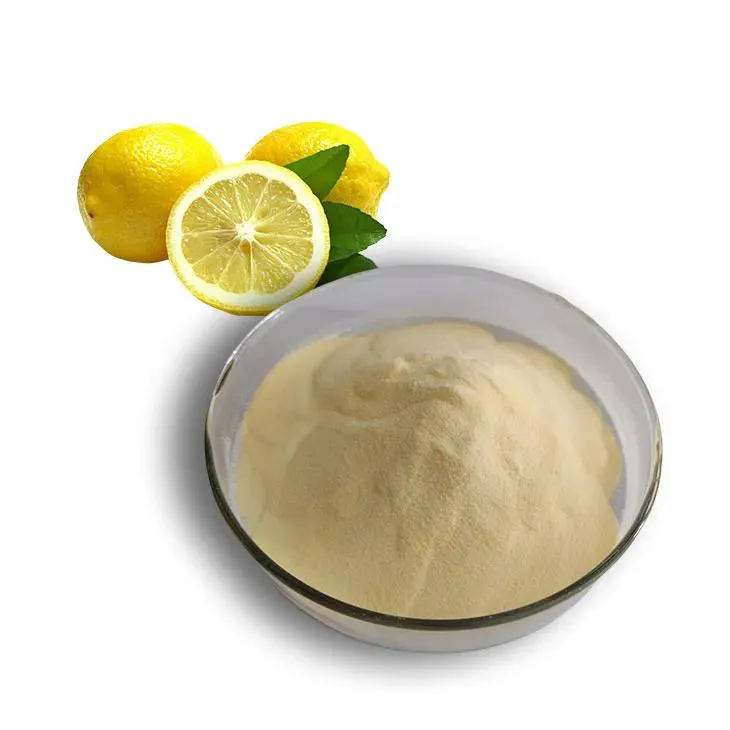- 0086-571-85302990
- sales@greenskybio.com
Lemon juice powder: components in fertilizers and feeds.
2024-11-30

1. Introduction
Lemon Juice Powder is a concentrated form of lemon juice that has potential applications in both fertilizers and animal feeds. It contains a variety of chemical components that can have significant impacts on plant growth and animal nutrition. Understanding these components and their functions is crucial for maximizing the benefits of Lemon Juice Powder in these areas.

2. Components of Lemon Juice Powder
2.1 Acidity
Lemon juice powder is acidic in nature, mainly due to the presence of citric acid. Citric acid plays a crucial role in both fertilizers and feeds. In fertilizers, the acidity can help in adjusting the soil pH. Many plants prefer slightly acidic soil, and the addition of lemon juice powder can lower the pH of alkaline soils, making essential nutrients more available to plants. For example, in alkaline soils, some micronutrients like iron, manganese, and zinc may be less available to plants. The acidity from lemon juice powder can release these nutrients, promoting better plant growth.
In animal feeds, the acidity can have a positive impact on the digestive system of animals. It can help in the breakdown of feed components, especially in monogastric animals such as pigs and poultry. The acidic environment created by lemon juice powder can enhance the activity of digestive enzymes, leading to better nutrient absorption. Additionally, it can also help in preventing the growth of harmful bacteria in the digestive tract, as many harmful bacteria do not thrive in acidic conditions.
2.2 Vitamin Content
Lemon juice powder is a rich source of vitamins, particularly vitamin C. Vitamin C is an antioxidant that has multiple functions. In fertilizers, it may not directly affect plant growth in the same way as macronutrients, but it can play a role in stress tolerance. Plants exposed to environmental stresses such as drought, salinity, or pollution can benefit from the antioxidant properties of vitamin C. It can help in scavenging reactive oxygen species (ROS) generated during stress conditions, protecting plant cells from damage.
In animal feeds, vitamin C is essential for the normal growth and development of animals. It is involved in various physiological processes such as collagen synthesis, immune function, and antioxidant defense. For some animals, like guinea pigs and certain fish species, vitamin C is a dietary essential as they cannot synthesize it on their own. Adding lemon juice powder to their feeds can be a natural way to supplement vitamin C, improving their overall health and performance.
Besides vitamin C, lemon juice powder may also contain other vitamins in smaller amounts, such as vitamin B - complex vitamins. These vitamins can also contribute to the nutritional value of animal feeds. For example, B - vitamins are involved in energy metabolism in animals, and their presence in the feed can ensure efficient utilization of energy from the diet.
2.3 Organic Matter
The organic matter in lemon juice powder is another important component. It consists of various organic compounds such as sugars, amino acids, and phenolic compounds. In fertilizers, organic matter improves soil structure. It helps in increasing soil porosity, allowing better air and water movement in the soil. This, in turn, promotes root growth and nutrient uptake by plants. The organic matter can also act as a food source for soil microorganisms. These microorganisms play a vital role in nutrient cycling in the soil. They break down organic matter and release nutrients in forms that plants can absorb.
In animal feeds, the organic matter in lemon juice powder can provide additional energy sources for animals. The sugars present can be easily digested and metabolized by animals, providing a quick source of energy. Amino acids are the building blocks of proteins, and their presence in the feed can supplement the amino acid requirements of animals. Phenolic compounds, although present in small amounts, may have antioxidant and antimicrobial properties in the digestive tract of animals, similar to their functions in plants.

3. Using Lemon Juice Powder in Fertilizers
3.1 Preparation and Application
When using lemon juice powder in fertilizers, it is important to consider the proper preparation and application methods. First, the lemon juice powder should be dissolved in water to make a solution. The concentration of the solution depends on the specific requirements of the plants and the soil conditions. For example, for plants that are more sensitive to acidity, a lower concentration of lemon juice powder solution may be used.
The solution can be applied to the soil either by watering the plants with it or by spraying it on the soil surface. It is advisable to apply the solution evenly to ensure that all parts of the soil receive the beneficial components. In addition, the frequency of application also needs to be determined. Over - application of lemon juice powder can lead to excessive acidity in the soil, which may be harmful to plants. Therefore, it is recommended to start with a small amount and gradually increase the dosage while observing the plant's response.
3.2 Compatibility with Other Fertilizers
Lemon juice powder can be used in combination with other fertilizers to enhance its effectiveness. For instance, it can be combined with nitrogen - based fertilizers. Nitrogen is an essential macronutrient for plant growth, and the acidity of lemon juice powder can help in preventing the loss of nitrogen through volatilization. By reducing the soil pH, the ammonium form of nitrogen can be more stable in the soil, increasing its availability to plants.
It can also be used with phosphorus - based fertilizers. In alkaline soils, phosphorus may be fixed and become less available to plants. The acidity of lemon juice powder can solubilize phosphorus, making it more accessible to plants. However, when combining lemon juice powder with other fertilizers, it is necessary to ensure that the chemical reactions between them do not lead to the formation of insoluble compounds that may reduce the nutrient availability.

4. Using Lemon Juice Powder in Animal Feeds
4.1 Incorporation into Feed Formulations
When incorporating lemon juice powder into animal feed formulations, it is important to consider the nutritional requirements of the animals. The amount of lemon juice powder added should be based on factors such as the animal's species, age, and production stage. For example, growing animals may require more vitamin C and other nutrients from lemon juice powder compared to adult animals that are not in a growth phase.
The lemon juice powder can be mixed with other feed ingredients such as grains, protein sources, and minerals. It is essential to ensure a uniform distribution of the powder in the feed to avoid any local over - or under - dosage. This can be achieved by using proper mixing equipment and techniques. Additionally, the stability of the components in lemon juice powder during feed processing and storage should also be considered. Some vitamins may be sensitive to heat, light, or moisture, and appropriate measures should be taken to preserve their activity.
4.2 Effects on Animal Health and Performance
The use of lemon juice powder in animal feeds can have several positive effects on animal health and performance. As mentioned earlier, the acidity can improve digestion and nutrient absorption. This can lead to better growth rates in animals, especially in young animals. The antioxidant properties of vitamin C and other components in lemon juice powder can also enhance the immune system of animals, making them more resistant to diseases.
In addition, the presence of organic matter in lemon juice powder can improve the palatability of the feed. Animals are more likely to consume feeds that taste good, which can ensure that they receive the necessary nutrients. This is particularly important for animals that are picky eaters or during periods of stress when their appetite may be reduced.

5. Conclusion
In conclusion, lemon juice powder contains a variety of components that can be beneficial in both fertilizers and animal feeds. Its acidity, vitamin content, and organic matter all play important roles in enhancing plant growth and improving animal nutrition. However, proper understanding and careful application are required to fully realize these benefits. Future research could focus on further exploring the interactions between lemon juice powder components and other substances in fertilizers and feeds, as well as optimizing the application methods to achieve maximum effectiveness.
FAQ:
What are the main components of lemon juice powder?
Lemon juice powder mainly contains citric acid, various vitamins (such as vitamin C), minerals, and some organic matter. Citric acid gives it acidity, vitamins play important roles in biological processes, and organic matter can contribute to soil fertility or feed nutrition.
How does the acidity of lemon juice powder affect fertilizers?
The acidity of lemon juice powder can influence the soil pH. In some cases, it can acidify the soil slightly. This is beneficial for plants that prefer acidic soil conditions as it can help in making certain nutrients more available, such as iron and manganese. However, excessive acidity may also need to be monitored to avoid negative impacts on soil microorganisms.
What role do vitamins in lemon juice powder play in animal feeds?
Vitamins in lemon juice powder, especially vitamin C, can act as antioxidants in animal feeds. They can help improve the immune system of animals, enhance their resistance to diseases, and may also contribute to better growth and development by participating in various metabolic processes within the animals' bodies.
How can the organic matter in lemon juice powder improve soil fertility as a fertilizer?
The organic matter in lemon juice powder can improve soil structure. It can increase the soil's water - holding capacity, making it easier for plants to access water. Additionally, as it decomposes, it releases nutrients slowly, providing a continuous source of nourishment for plants. It can also enhance the activity of soil - dwelling organisms that are beneficial for plant growth.
Is lemon juice powder safe to use in animal feeds?
When used in appropriate amounts, lemon juice powder is generally safe in animal feeds. However, it is important to consider the overall balance of the feed composition. Excessive amounts may cause digestive problems in animals due to its acidity or other components. Also, any potential allergens need to be taken into account for different animal species.
Related literature
- The Role of Organic Acids in Fertilization and Soil Health"
- "Vitamins in Animal Nutrition: Importance and Deficiency Symptoms"
- "Utilizing Organic Matter for Sustainable Soil Fertility"
- ▶ Hesperidin
- ▶ Citrus Bioflavonoids
- ▶ Plant Extract
- ▶ lycopene
- ▶ Diosmin
- ▶ Grape seed extract
- ▶ Sea buckthorn Juice Powder
- ▶ Fruit Juice Powder
- ▶ Hops Extract
- ▶ Artichoke Extract
- ▶ Mushroom extract
- ▶ Astaxanthin
- ▶ Green Tea Extract
- ▶ Curcumin
- ▶ Horse Chestnut Extract
- ▶ Other Product
- ▶ Boswellia Serrata Extract
- ▶ Resveratrol
- ▶ Marigold Extract
- ▶ Grape Leaf Extract
- ▶ New Product
- ▶ Aminolevulinic acid
- ▶ Cranberry Extract
- ▶ Red Yeast Rice
- ▶ Red Wine Extract
-
Chaste Berry Extract
2024-11-30
-
Mulberry Extract
2024-11-30
-
Coconut Water Powder
2024-11-30
-
Grapefruit Seed Extract Powder
2024-11-30
-
Jujube Extract
2024-11-30
-
Yellow Pine Extract
2024-11-30
-
Lily extract
2024-11-30
-
Horse Chestnut Extract
2024-11-30
-
White Peony Extract
2024-11-30
-
Buckthorn bark extract
2024-11-30





















